
Topics
Condoleezza Rice singled out Venezuelan President Hugo Chavez at her confirmation hearing for Secretary of State calling his rule “very deeply troubling.” The most interesting exchange came from Republican Senator Lincoln Chafee of Rhode Island. We play an excerpt of the hearing and speak with Larry Birns of the Council on Hemispheric Affairs. [includes rush transcript]
While the abuse of detainees and the war in Iraq formed a major part of yesterday’s hearings, Rice also singled out Venezuelan President Hugo Chavez calling him a “democratically elected leader who governs in an illiberal way.”
Chavez was elected president in 1998. He has condemned the U.S. invasions of Iraq and Afghanistan and threatened to cut off oil sales to the United States. Since then, more than $1 million in U.S. government money has been given to Venezuelan opposition groups for democracy-training programs under the auspices of the National Endowment for Democracy–a private agency funded entirely by the U.S. government.
Last August, Chavez survived a referendum to recall him. The vote marked the eighth time Chavez’s mandate as leader has been approved since 1998, after two presidential elections and six referendums. Chavez supporters criticize the U.S. for supporting a failed coup attempt against the president in April 2002. Chavez was removed from power by a coalition of military officials and business leaders but returned to office two days later.
At her confirmation hearing yesterday, Condoleezza Rice reserved some of her harshest language for Chavez, calling his rule “very deeply troubling.” While a number of Senate Democrats questioned Rice about Venezuela, the most interesting exchange came from Republican Senator Lincoln Chafee of Rhode Island.
- Sen. Lincoln Chafee (R-RI) questioning Secretary of State nominee Condoleezza Rice about her comments on Venezuela, January 18, 2005.
- Larry Birns, Director of the Council on Hemispheric Affairs in Washington DC.
Transcript
AMY GOODMAN: At her confirmation hearings yesterday, Dr. Condoleezza Rice reserved some of her harshest language for Chavez, calling his rule, quote, “very deeply troubling.” While a number of Senate democrats questioned Rice about Venezuela, the most interesting exchange came from republican Senator Lincoln Chafee of Rhode Island.
SENATOR LINCOLN CHAFEE: It seems to be a hypocritical approach to our foreign policy in some ways, in particular how we deal with some of those democracies such as Russia, Senator Biden said, uneven or undemocratic or some of the Turkmenistan, Uzbekistan, Tajikistan, even Musharraf, President Musharraf, and then on the other hand have a completely different view of, say, Iran, as Senator Biden was saying. It seems to magnify our differences on one hand and on the other hand, we magnify our similarities. In particular after having just come back from South America and meeting with President Chavez. Here he has gone before his people, high, high turnout. Just had a referendum, and as one of the people from our embassy said, they cleaned their clocks and kicked their butts. It seems to me to say derogatory things about him may be disrespectful to him, but also to the Venezuelan people. How do you react to that?
CONDOLEEZZA RICE: Well, I have nothing but good things to say about the Venezuelan people. They are a remarkable people, and if you notice, Senator Chafee, I was not making derogatory comments, I was simply recognizing that there are unhelpful and unconstructive trends going on in Venezuelan policies. This is not personal.
SENATOR LINCOLN CHAFEE: And there aren’t in Tajikistan, Uzbekistan —
CONDOLEEZZA RICE: And we —
SENATOR LINCOLN CHAFEE: —- and Russia and -—
CONDOLEEZZA RICE: And we speak out about those.
SENATOR LINCOLN CHAFEE: Pakistan?
CONDOLEEZZA RICE: We speak out about those as well, but some of this is a matter of trend lines and where countries have been, and where they are now going.
SENATOR LINCOLN CHAFEE: Are their governments unconstructive?
CONDOLEEZZA RICE: Well, the Russian government is not unconstructive in a lot of areas. It’s quite constructive in many areas. It’s been more constructive on Iran in recent years. It is constructive on — to a certain extent in trying to deal with the kind of Nunn-Lugar issues that we have talked about. It’s been constructive in Afghanistan. It’s constructive on a number of areas, but that doesn’t excuse what is happening inside Russia where the concentration of power in the Kremlin, to the detriment of other institutions, is a real problem. And we will continue to speak to the Russians. I think we do have to remember that it is also not the Soviet Union. The Russians have come quite a long way from where the Soviet Union was, and we need to always keep that in mind when we judge current policies, but where they’re going is simply not very good. It is something to be deeply concerned about, and we will speak out. Countries are going to move at different speeds on this democracy test. I don’t think there’s any doubt about that. But what we have to do is that we have to keep the agenda — keep this item on the agenda. We have to continue to press countries about it. We have to support democratic forces and civil society forces wherever we can. I would just note that Ukraine, I visited in 2001, not long after I had become National Security Adviser, and I frankly when this happened in Ukraine was pretty stunned by how effective civil society was and how effective the Ukrainian people were in making their voices known. Some of that is because we and the E.U. and others have spent time developing civil society, developing political opposition, working with people, not to have a specific candidate in any of these countries, but to have a political process that’s open. And we have to do more of that. We’re going to spend some $43 million this year, I believe that’s the number, on Russian institutions, trying to help the development of civil society there. We need to do more of that kind of thing, because while we put it on an agenda, while we confront the governments that are engaged in non-democratic activities, we also have to help the development of civil society in opposition.
SENATOR LINCOLN CHAFEE: You and Senator Boxer were having a little bit of a debate over credibility, and to me, it seems as though trust is built with consistency. Is it possible for you to say something positive about the Chavez administration?
CONDOLEEZZA RICE: It’s pretty hard, Senator, to find something positive. Let me say this.
SENATOR LINCOLN CHAFEE: I don’t understand that, after Tajikistan —
CONDOLEEZZA RICE: Let me say this.
SENATOR LINCOLN CHAFEE: — Pakistan, Russia. It seems as though, as I say, magnifying our differences to some countries and magnifying our similarities with others. And as I said, I think trust is built with consistency, and I don’t see consistency in some of your comments.
CONDOLEEZZA RICE: The state of behavior in the western hemisphere, the sate of affairs in the western hemisphere, is such that we have had democratic revolutions in all of these places, and we don’t want to see them go back. We have some places where the democratic revolution is still to take place. We just have to understand that there are differences in that regard. But I have said, we hope that the government of Venezuela will continue to recognize what has been a mutually beneficial relationship on energy and that we can continue to pursue that. We certainly hope that we can continue to pursue counter-drug activities in the Andean region, and Venezuela participates in that. But I have to say that for the most part, the activities of the Venezuelan government in the last couple of years have been pretty unconstructive.
SENATOR LINCOLN CHAFEE: Well, thank you very much. I’ll go back to what I said earlier. It seems disrespectful to the Venezuelan people. They have spoken.
AMY GOODMAN: That was republican Senator Lincoln Chafee of Rhode Island questioning Condoleezza Rice at her confirmation hearings as Secretary of State. Joining us in the studio is Larry Birns. He is director of the Council on Hemispheric Affairs, based in Washington, D.C., here in New York today. In a few minutes, we’re going to go back to the confirmation hearing excerpts, and hear Dr. Rice on Haiti, but Larry Birns, as we listen to a representative of the Bush administration explaining Venezuela policy, and her response to questions of a republican senator on Venezuela, your response?
LARRY BIRNS: Well, not only has the United States — the Bush administration — been disrespectful, it abetted a coup. I think that you can’t be much more disrespectful than that. Also, it’s had a policy of glaring double standards and misrepresentation of the facts. The fact is that President Chavez, no matter how noisy and ravish he might be, has pretty much been a constitutional president. There have been minor human rights violations, if you take the opposition’s charges seriously. But they’re minor. He has respected free press, freedom of opinion. What nettles the opposition and the United States is he has got the numbers. That is, 90% of the Venezuelans are poor. That’s his constituency. 10%, the middle class and the upper class, have most of the consecrated wealth of the country, but they don’t have the votes. And the middle class is becoming increasingly frustrated over this, and in fact, a former democratic president of Venezuela recently said that this isn’t a matter of discussion. We have to kill Chavez. And, of course, recently, the administration — I think it was Condoleezza Rice herself — denounced the packing of the Supreme Court that President Chavez had done. I mean, he expanded the number of judges favorable to him, yes, but it’s interesting that in adjoining Colombia, which is Washington’s principal ally in Latin America, President Uribe stormed through a piece of legislation that would not only deny Congress any later option to deny him the ability of a second term, but would ban the constitutional court from ruling — which has been an opposition factor in the country — from ruling that he cannot stand for another election. That is pure stuffing of the court as well, but this, of course, wasn’t on the administration’s agenda.
AMY GOODMAN: And the evidence that the U.S. was involved in the attempted coup against Chavez?
LARRY BIRNS: It is beyond dispute. What happened was a delegation of the Venezuelan middle class, including the man who eventually became the president for some hours, came to Washington, met with Otto Reich. Otto Reich —- they started talking about the coup, according to Reich. Reich winks, and says to -—
AMY GOODMAN: And Reich’s position?
LARRY BIRNS: At the time he was Assistant Secretary of State, Interim, because the Senate Foreign Relations Committee refused to vote on his nomination, including Senator Lugar, because he was considered to be too controversial. That’s the point. That it’s not what Rice has done, it’s the fact that both Colin Powell as Secretary of State and Condoleezza Rice essentially cashiered out the inter-American bureau to a group of right wing ideologues, like Roger Noriega, who is currently the Assistant Secretary of State, John Bolton, who is a madman, certifiably, and Otto Reich. Policy-making was transferred to them, and so Bush — Powell and Rice would make ceremonial statements, but didn’t have really operational control. They permitted these groups of ideological gangsters to formulate policies that essentially were on their agenda towards Haiti, towards Venezuela, towards Cuba.

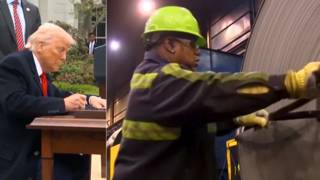

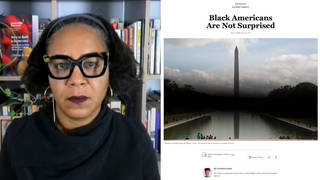
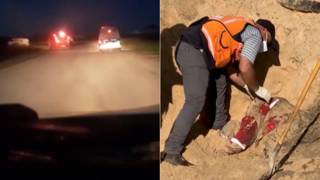





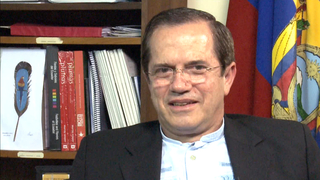
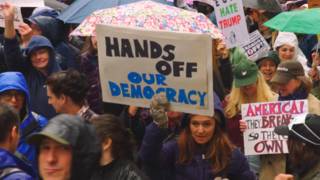
Media Options